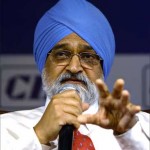 Putting agriculture as “one of the central elements” of the Plan would be a challenge. The 11th Plan is to start from April 1,2007. The next General Election is due in 2009. So, the 11th Plan document is both politics and economics! Readers can draw their own conclusions! Populist language abound in the document, at the same time we get the usual percentages debate!
Putting agriculture as “one of the central elements” of the Plan would be a challenge. The 11th Plan is to start from April 1,2007. The next General Election is due in 2009. So, the 11th Plan document is both politics and economics! Readers can draw their own conclusions! Populist language abound in the document, at the same time we get the usual percentages debate!
The full meeting of the Planning Commission had discussed the 11th Plan draft. The goals are all fine, a progressive rise in the rate of economic growth. The growth has to be inclusive, every segment of the economy and society must benefit. The Commission’s proceedings as briefed by Ahluwalia were rather routine and dull in the sense it covered the subject of planning process in so many separate compartments like finding resources etc. The usual ego clashes between the Finance Minister and Ahluwalia over whether to implement the fiscal responsibility bill etc were just as routine. So, were the PM’s usual non-committing remarks like making more credit accessible by farmers, by bringing in micro finance, regulating the private money lenders in the rural areas etc. These are all extremely complicated issues.
Even there is no way to find out whether government’s directive to the commercial banks to reach a target is achieved or not or what is being done on that front. The impression the Finance Minister gives is that he doesn’t care much for the farmers! So, too the brief reference to putting agriculture at the centre piece of action for the 11th Plan is very brief to the point of making it just a matter of customary reference to a very touchy subject!
What the National Commission on Farmers has said towards this end? In revamping the 11th Plan programmed for the agric sector? It seems that the government is functioning (or not functioning?) at many levels on the individual ministers’ ways of doing their jobs. It is the SEZs that gives an insight into the way the government is functioning. Is the SEZs a Cabinet decision? Or, is it, as it seems, just an implusive act on the part of the Commerce Minister? Already Sonia Gandhi had struck a dissenting or seemingly dissenting note. May be it is she who has to face the electorate when the elections come. None of the high profile players in the current government drama seem to have any stake in the elections or their outcome! They are all men from nowhere and once the elections go against the Congress party they might go into oblivion or they might switch sides so easily as well. After all, most of the Sonia favourites in the ministry are there not with their own mass base and that suits Sonia Gandhi as well. But the real burden will be on the people and the poor of the country.
The Asian Development Bank in its recent Survey,” Millennium Development Goals: Progress in Asia and the Pacific,2006″says that in achieving the Mugs, though India is catching up ,India, Afghanistan and Nepal’s latest status is below the region’s average”. This aspect is missing from the Planning Commission discussions, as far as we can see. There is a tight-lip approach in this government whenever the PM appears or whenever there is an honest need for introspection. It is all just routine, everyone makes his speech and everyone seems to be very brief, may be the PM is given to such oral mode and also the wisdom acquired over years of service in various governments, the less is always better for the government work of the day!
The Prime Minister and his ministers must tour the country, visit the interior parts. This they have not done! One has not seen the Finance Minister in the State capitals, nor can the high-salaried Planning Commission Members be seen or can be identified with their expertise in the respective fields.
Unless, we have new and fresh faces, men and women with ideas, as in some schemes in Bangalore where we have seen the Public-Private Partnership concept is put into action as in the Bangalore Agenda Task Force, how do you hope your government would be identified with the talented citizens? The latest Peace Nobel Prize to Prof. Mohammed Yunus must inspire the government and ministers to try that concept in rural credit expansion.
Rural India, as we are saying, would change only when other urban India infrastructure, more national highways and more telecom services and more info kiosks and so on catch up. Anyway, the educated youth in India surprisingly remain calm, there is no youth restlessness, except in the OBC reservations. But then, this doesn’t mean the youth would believe whatever the government tells them. We need a more honest approach to governance, a transparent government is the best guarantee for the success of any development goals.
Image Source : topnews.in